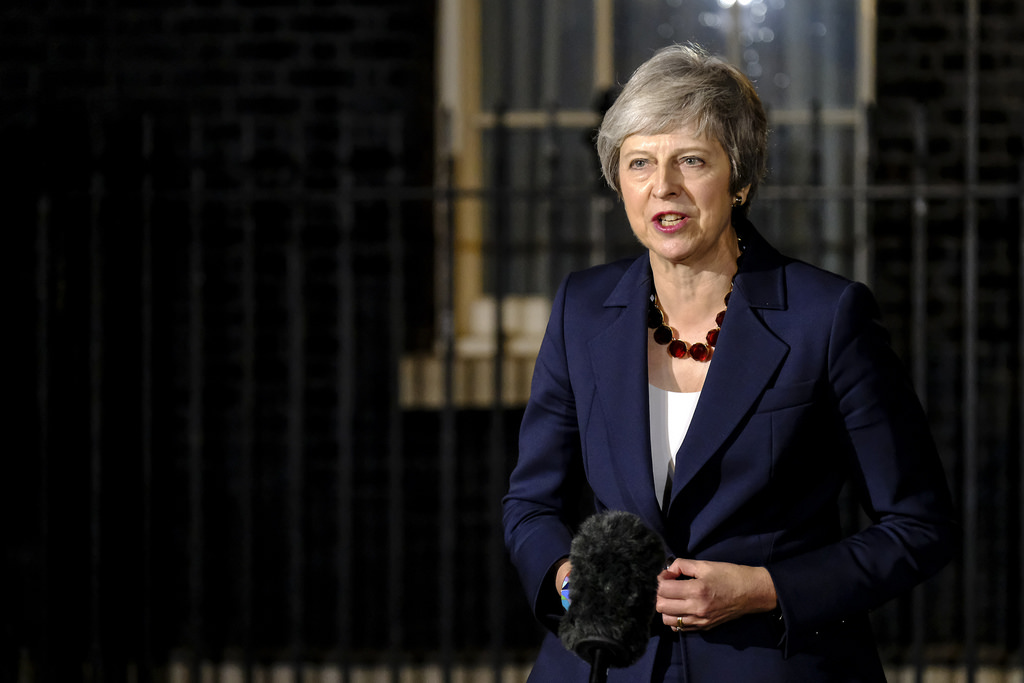Overcoming furious rivals, British Prime Minister Theresa May has convinced her cabinet to support the “soft” Brexit deal with the European Union.
The real test will come in a U.K. parliamentary vote, likely in December, after the November 25 EU summit votes to approves the draft withdrawal agreement.
In the meantime, May is fighting off an internal revolt from “hard” Brexit MPs, principally the inaptly named European Research Group headed by the stage aristocratic Englishman Jacob Rees-Mogg, who wants to replace her as Conservative party leader.
Britain is currently experiencing what political economist Will Hutton called the worst political crisis since the end of the Second World War, precipitated by the 2016 vote to “leave” the EU, and amplified by the realization that checking out of Hotel Europe was more complicated than the leave camp expected — and had even worse consequences than foreseen by the remain campaign.
The Conservatives are divided over whether to accept what the prime minister calls a deal in the national interest, or vote against the November 14 accord, and end up exiting the EU with no agreement — and tremendous uncertainty as to what comes next.
The Labour party is divided between those who want to honour the referendum choice to leave the EU and those who want a second referendum, a “people’s vote” they believe would confirm British EU membership.
To the surprise of most British public opinion leaders, the two-year Brexit negotiation put paid to the idea that the EU was an institution incapable of operating successfully.
The chief EU negotiator, Michel Barnier, a former French foreign minister and EU commissioner, was given very specific instructions as to what the EU would require from the U.K. as the price for leaving, and he proved capable of achieving his objectives.
In uncharacteristic fashion for the EU (or for international economic negotiations generally) Barnier opted for a transparent Brexit process. The EU negotiator scheduled weekly meetings with the ambassadors of the 27 EU member states. Negotiating texts with points of agreement and disagreement were circulated widely in European circles and reported in the press.
Through bringing member states along with him, Barnier created the nightmare situation every British PM had historically tried to avoid: a hostile confrontation with a continent united against it.
The EU, with a population of 447 million — nearly seven times that of the U.K. at 66 million — made its weight felt. It was able to maintain unity despite making concessions on issues like Gibraltar that left Spain less than satisfied.
In contrast, the U.K. entered negotiations unprepared for the main point of contention: maintaining an open border between Northern Ireland and the republic to the south — without creating an unbalanced relationship between Northern Ireland and the rest of the U.K.
The Irish Republic wanted to maintain free movement of goods and people across what becomes an EU-U.K. border in Ireland. This would help preserve the “Good Friday” accord that has brought peace to the troubled lands.
The U.K. negotiators were reluctant to concede what was being demanded; so, to accommodate the Irish, the Brexit deal is a temporary customs union between the U.K. and the E.U., pending a 21-month negotiating period for a lasting agreement.
For a seamless Irish border to exist, however, the U.K. had to agree to preserve a customs union for Northern Ireland with the EU indefinitely, in case the transitional negotiations failed to include it.
This “backstop,” which includes an EU veto that could come into play, has enraged the hard Brexit Tory faction. They abhor the clear limitation on British sovereignty and reject a betrayal of the leave referendum pledge to “take back control.”
The Scottish nationalists in Westminster see the matter differently. They plan to vote against the Brexit deal, because Scotland does not get the guarantees accorded to Northern Ireland to maintain free access to the EU market.
A permanent (and not just a temporary) customs union with access to the EU market is what many expected the U.K. to want as well. But it turns out that the price exacted by the EU includes constraints such as preventing the U.K. from doing other trade deals (such as with the U.S.) without EU approval, and, therefore the U.K. is prevaricating.
Labour will ask its MPs to vote against the deal, arguing that defeating it will provoke an election that Labour can win. Leader Jeremy Corbyn believes that workers’ rights, environmental protection, and prevention of social dumping need to be part of Brexit, and could be included in a renegotiated pact.
Applied to Brexit, the traditional British approach of “muddling through” has produced something close to political bedlam. While loud partisan shouting emanates from all sides, there is no majority in parliament, or in the population, for anything on offer: not the Brexit deal, or no Brexit, or a people’s vote.
Theresa May can count on business groups in civil society to rally to her call to prevent chaos by supporting her deal. But to win a parliamentary vote she is in the uncomfortable position of needing Labour support to compensate for the Conservatives who will vote against the Brexit deal.
Duncan Cameron is president emeritus of rabble.ca and writes a weekly column on politics and current affairs.
Photo: Number 10/Flickr
Help make rabble sustainable. Please consider supporting our work with a monthly donation. Support rabble.ca today for as little as $1 per month!





